Shakespeare Memes
Tuesday, April 23rd, 2019Happy 455th Birthday to Shakespeare!
In honor of the occasion, I present… Shakespeare Memes!
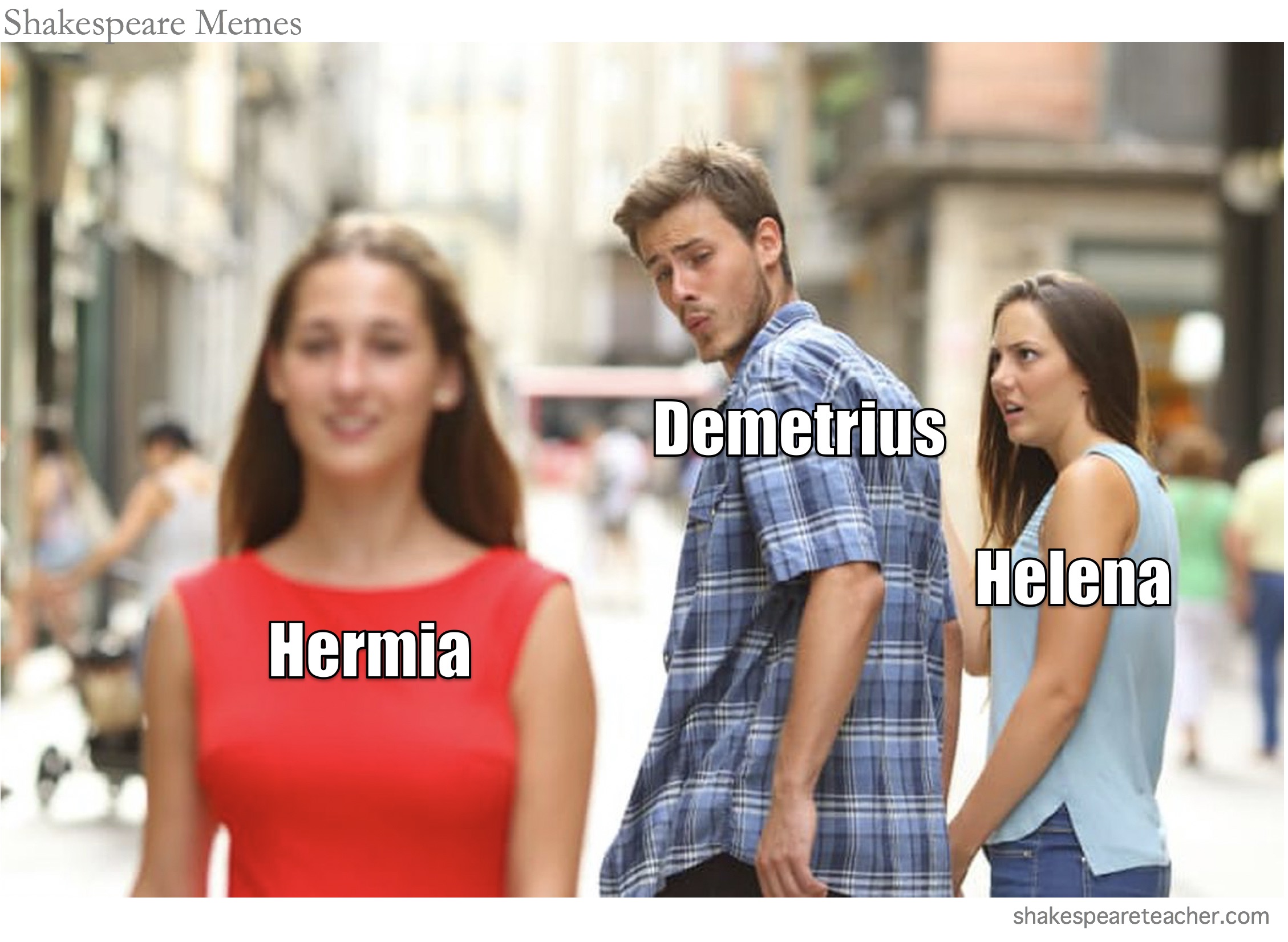

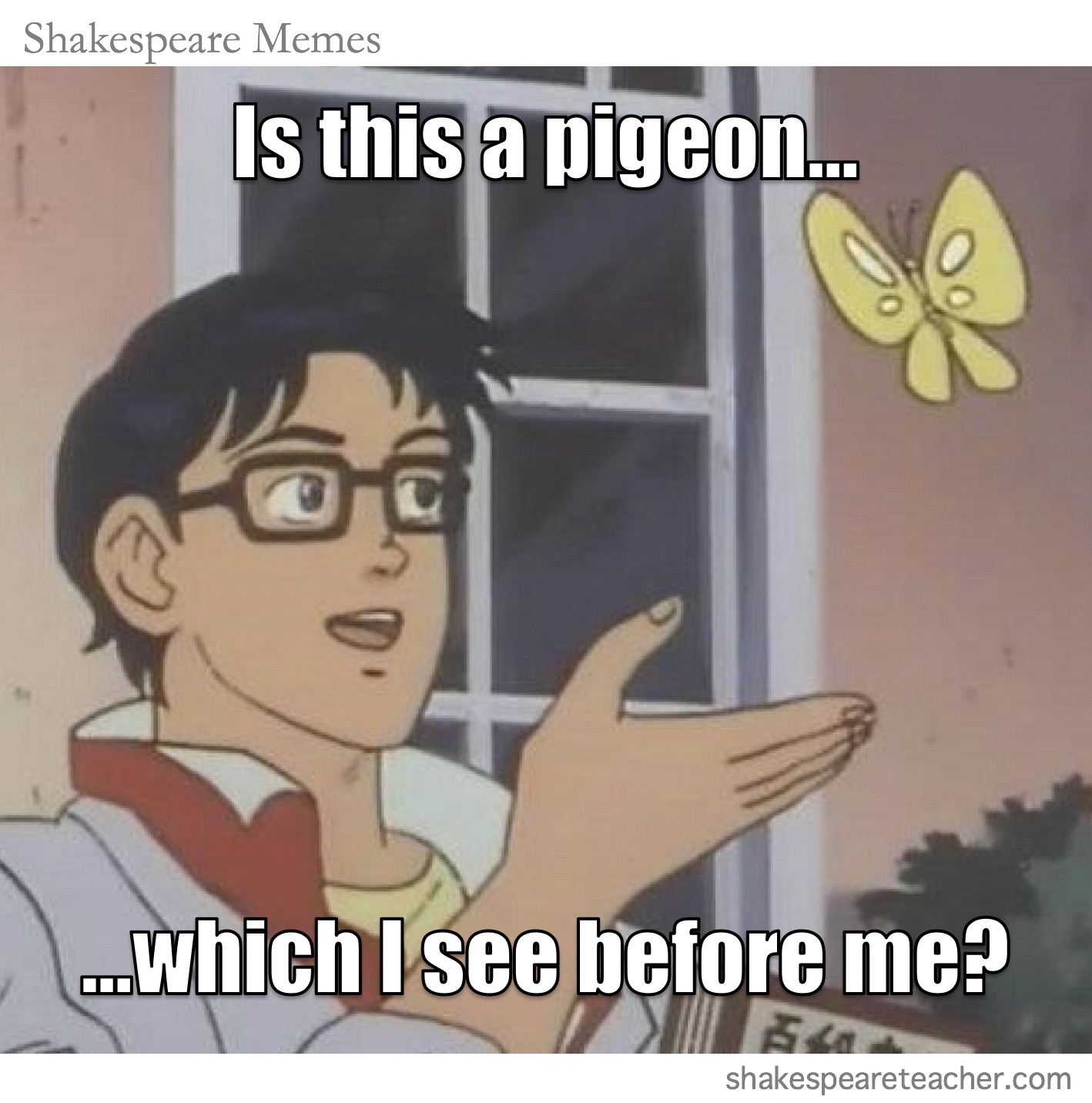

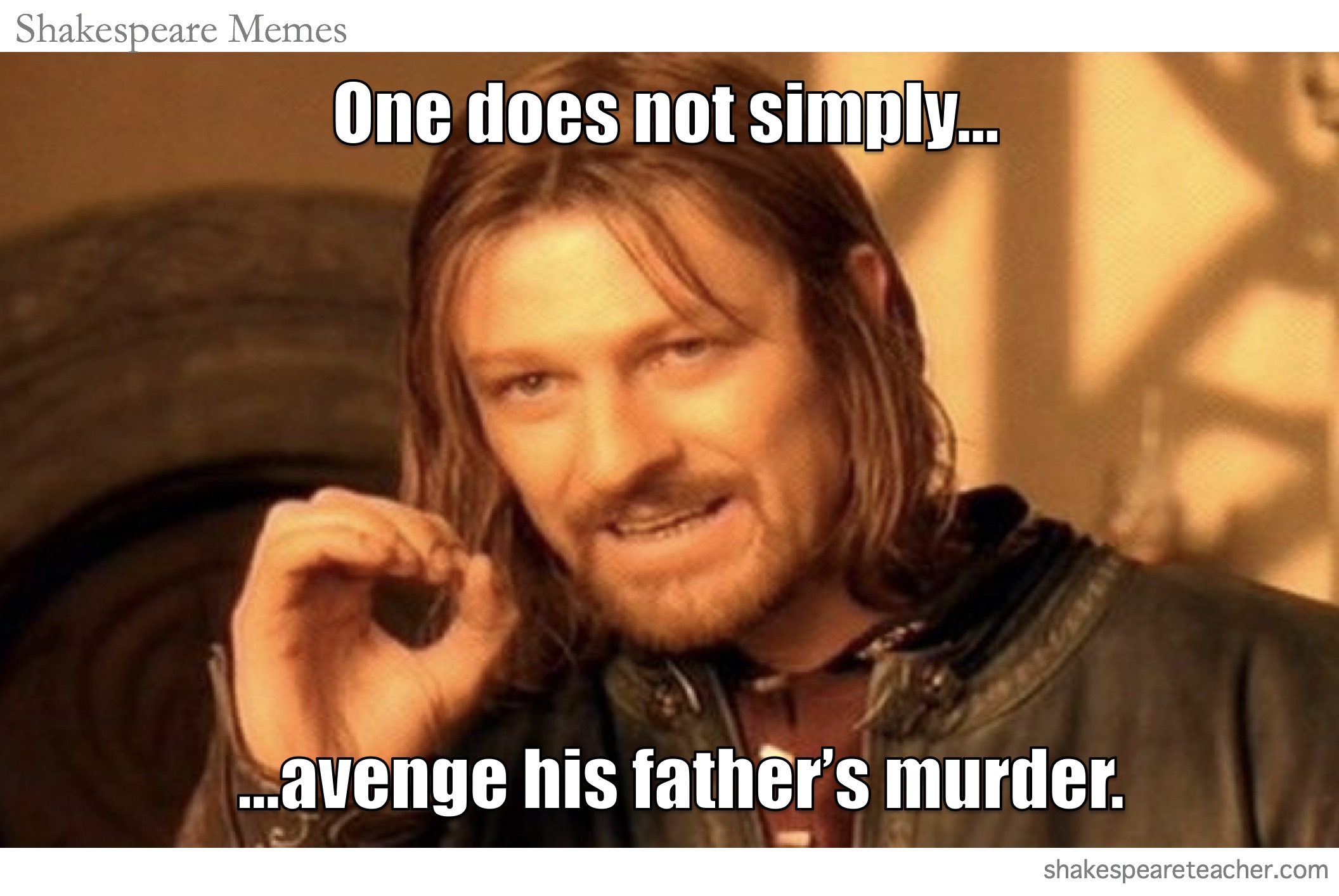


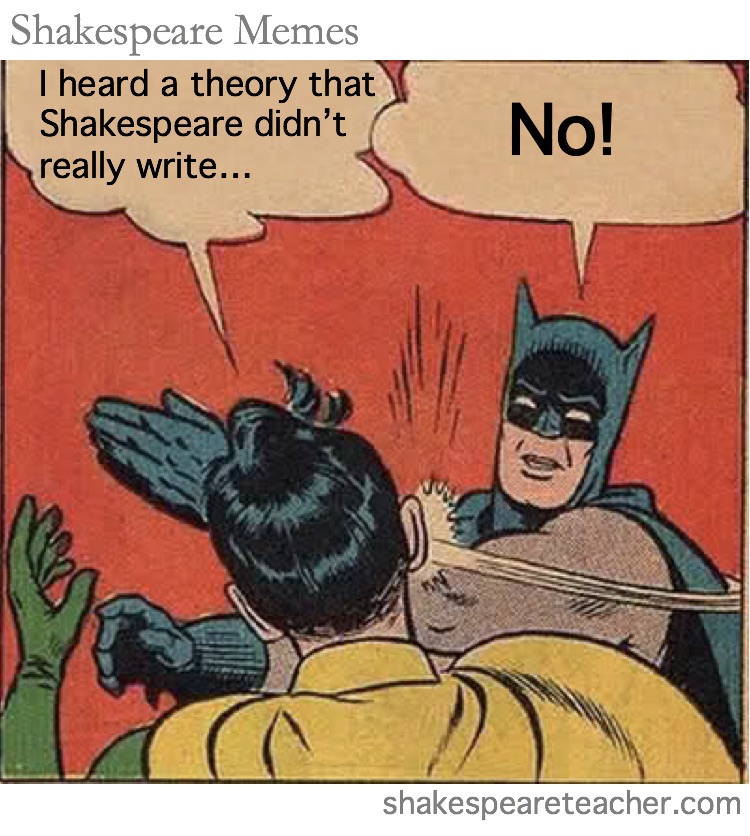
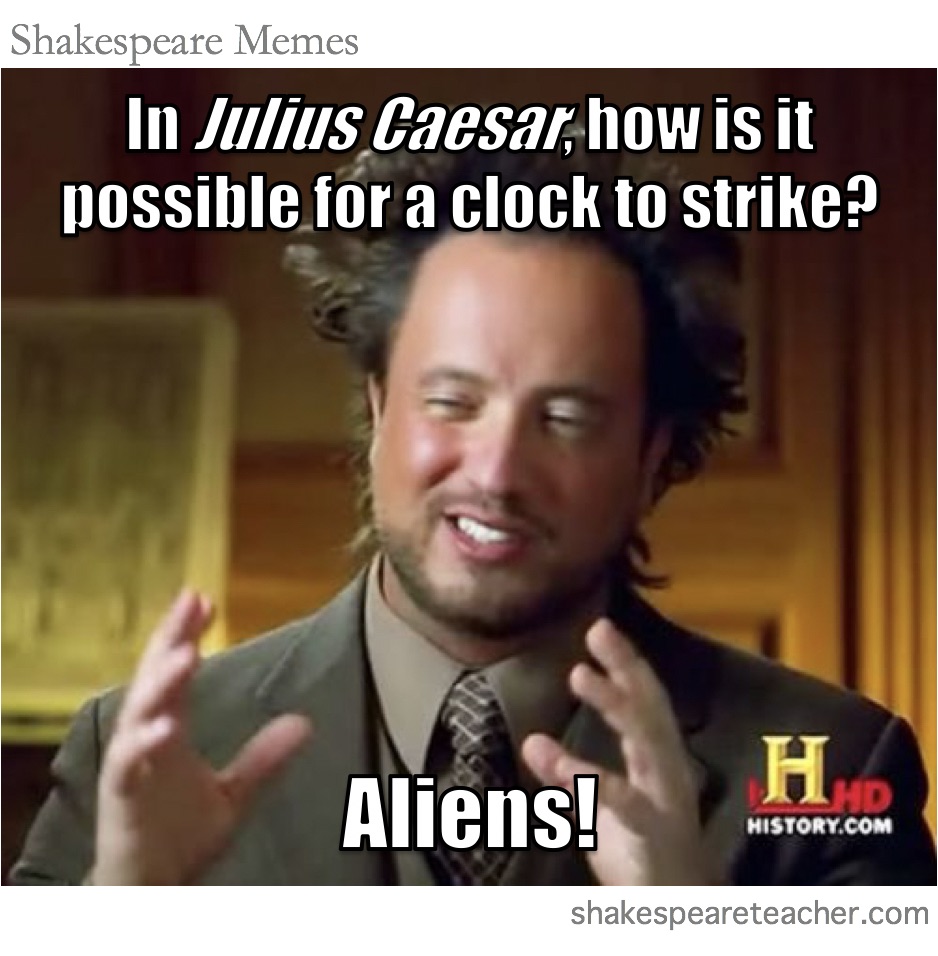
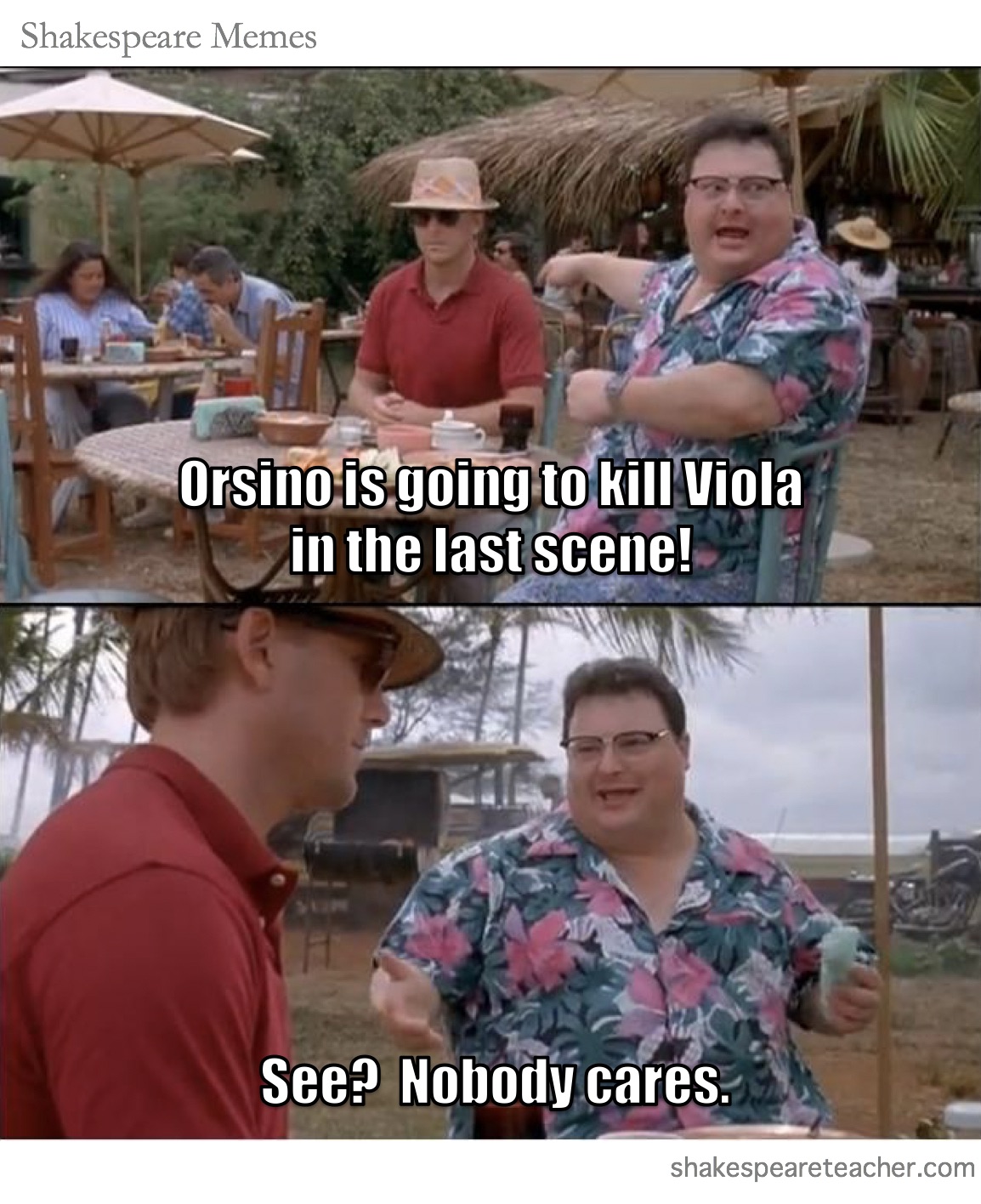
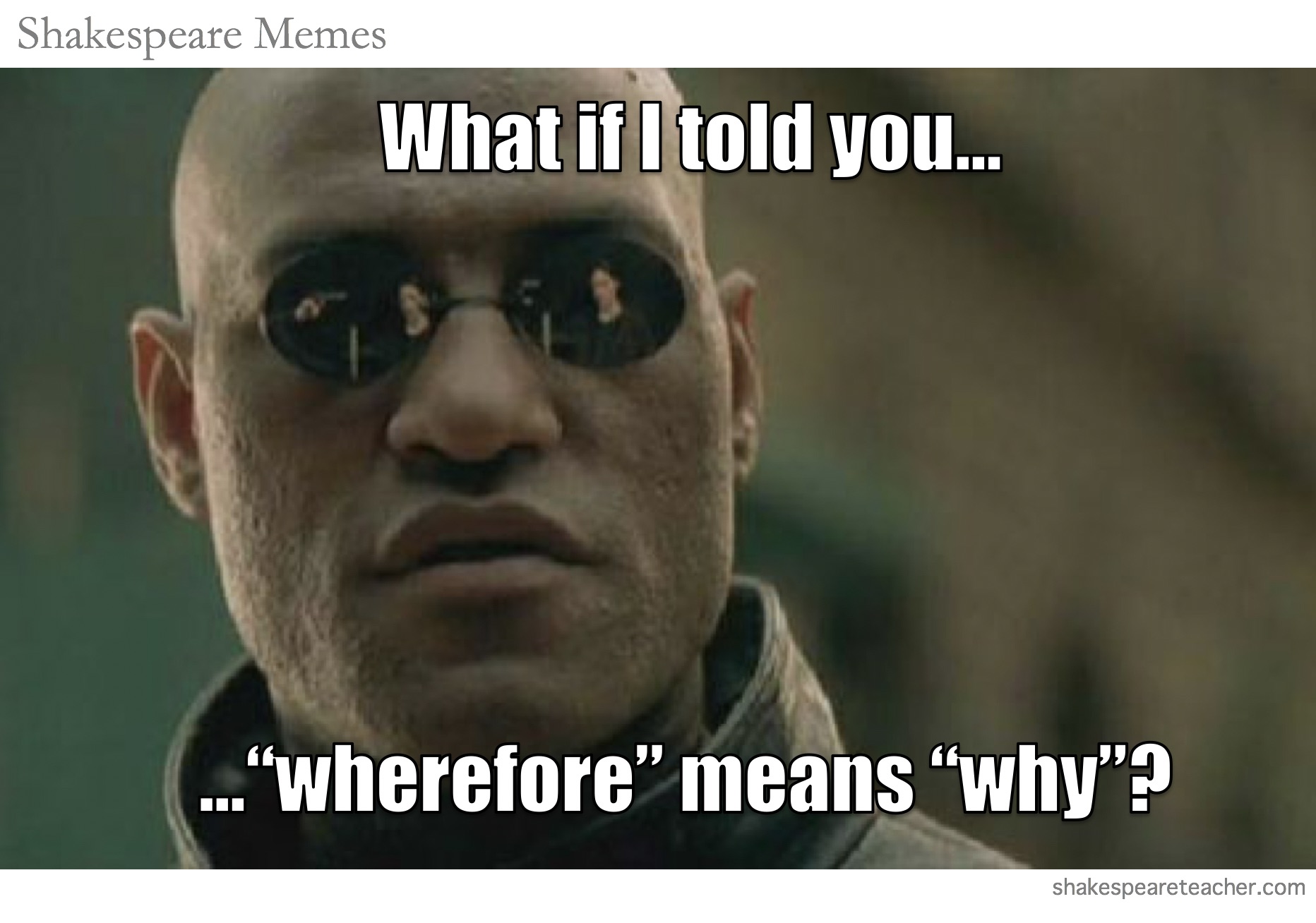
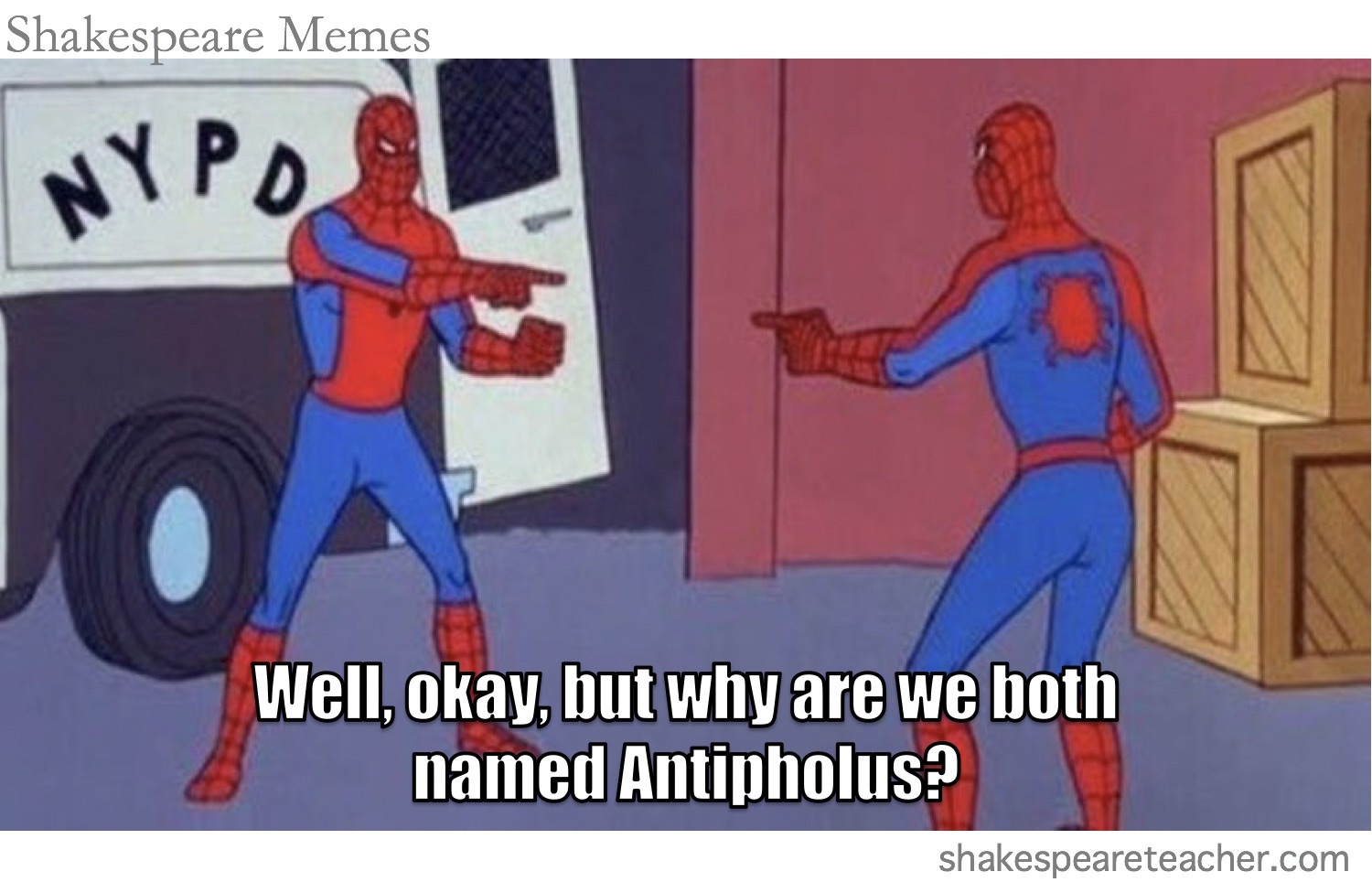
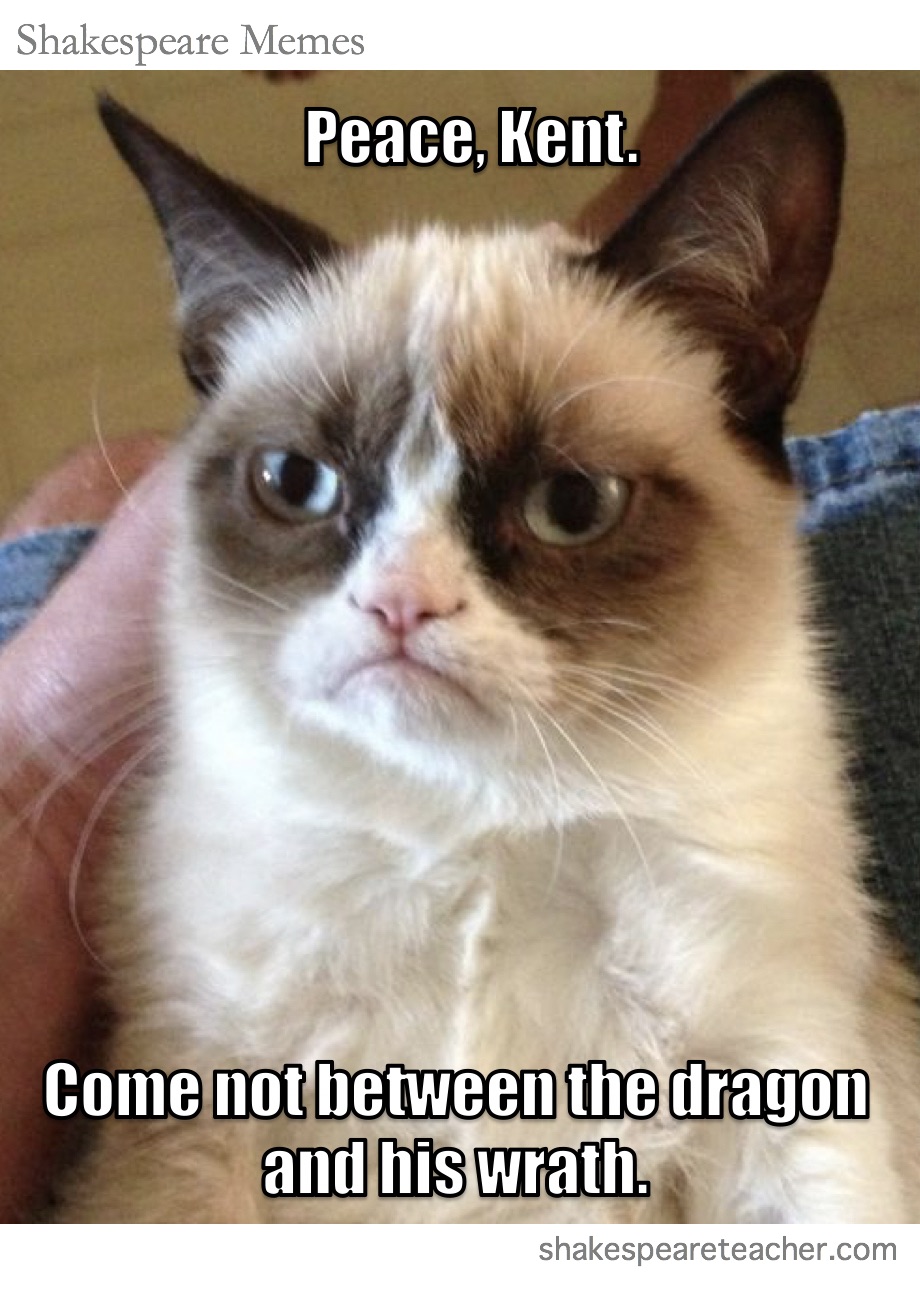

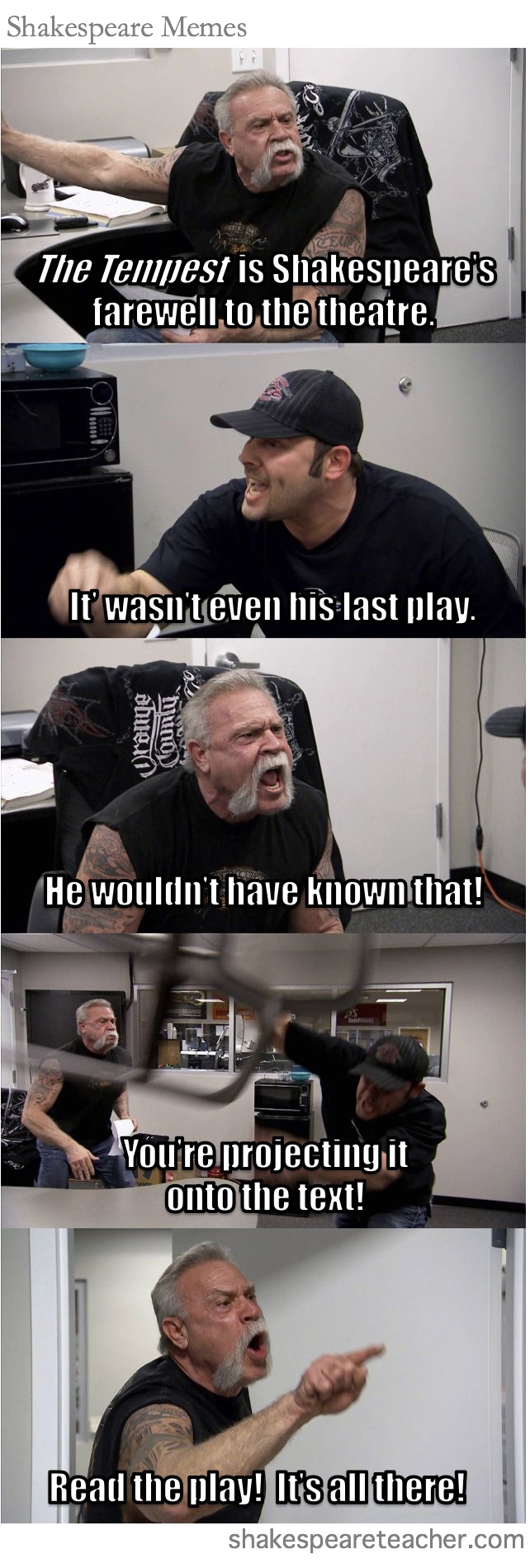
Happy 455th Birthday to Shakespeare!
In honor of the occasion, I present… Shakespeare Memes!















In this October 2016 TED talk, Shakespearean actor and educator Rob Crisell makes a passionate argument for Shakespeare, for teaching Shakespeare, and for teaching Shakespeare through performance. Whether you’re already with him on these three points or not, it’s well worth checking out:
In As You Like It, Celia reveals to Rosalind that she knows the name of Rosalind’s secret admirer. It is Orlando, who has already captured her heart. Immediately, Rosalind begins to pepper Celia with an overwhelming litany of questions, which causes Celia to exclaim:
It is as easy to count atomies as to resolve the propositions of a lover
Wait, what? Isn’t this the same play that said that the world is six thousand years old? How could Celia possibly know about atomic theory? Fortunately, there’s no job too small for the Shakespeare Follow-Up.
According to my Folger edition of the play (Barbara A. Mowat and Paul Werstine, eds.), the word “atomies” as used here means “dust particles in sunlight.” Oh.

Thou tell’st me there is murder in mine eye:
’Tis pretty, sure, and very probable,
That eyes, that are the frail’st and softest things,
Who shut their coward gates on atomies,
Should be call’d tyrants, butchers, murderers!
So that would appear to be that. But, wait! According to my Arden edition (Juliet Dusinberre, ed.), there’s more to the story. “Atomies” does indeed mean “tiny particles,” but…
The word, which occurs twice in AYL (see 3.5.13) and in no other Shakespeare play, may suggest the territory of the research conducted by Ralegh’s navigator, Thomas Harriot, into the atom and into optics, with particular relation to the refraction of light and the nature of visions.
(We’ll get back to Harriot, but as a side note, you may remember that Mercutio also uses the word “atomies” in the Queen Mab speech. To be fair, I checked my Arden edition of Romeo and Juliet (Brian Gibbons, ed.), and found instead the word “atomi,” which is from Q1. The Folio has “atomies.” So it’s arguable whether the word appears in another play, but the Arden is at least consistent. Even if you say the word is unique to As You Like It, however, the concept does appear in at least one other play.)
Atomism, the theory that all matter is made up of smaller units that cannot be further divided, was an idea embraced by several Pre-Socratic philosophers, most notably Leucippus and Democratus. Aristotle rejected this theory, believing that the four elements (earth, water, air, and fire) were continuous and infinitely divisible. As with most of these kinds of arguments, Aristotle’s version won the day. Although there were some notable figures who did believe in atomism throughout the ages, Aristotle’s theory was still the prevailing concept even in Shakespeare’s day. So in Twelfth Night, Viola gets Olivia’s attention by telling her “you should not rest/ Between the elements of air and earth, But you should pity me!” as Sir Toby asks Sir Andrew “Does not our life consist of the four elements?” when trying to make a point.
However, even in Shakespeare’s early seventeenth century, atomism was making a comeback, boasting such impressive adherents as Francis Bacon, René Descartes, Thomas Hobbes, and even Galileo. Thomas Harriot was an early contributor to the developing theory, though at a time when it was still dangerous to speak too openly about what was considered a heretical idea. It’s intriguing to think that the notion may have captured Shakespeare’s imagination as well, but this is merely speculation. I don’t think you can strongly infer this from his use of a particular word twice in a given play, especially when the second use of the word points fairly decisively in the other direction.
In 1808, John Dalton (building on the work of Lavoisier and Proust) demonstrated that when a substance (such as water) is broken down into its components (such as hydrogen and oxygen), the proportion can always be described with small integers, implying that there is a direct correspondence on some foundational level. His atomic theory of matter led to further inquiry and discovery throughout the 19th century. In the early 20th century, quantum mechanics allowed scientists such as Max Planck, Albert Einstein, and Nils Bohr to describe the unique properties of particles on the microscopic scale.
There’s a lot more to the story, but it will have to suffice to note that in the mid-20th century, science learned how to split the atom, unleashing the potential for a virtually unlimited power source, weapons of unthinkable destruction, and a series of ethical questions that have turned out to be much more difficult to resolve than even the propositions of a lover.
This is the last in a series of 40 pop-music parodies for Shakespeare fans.
So far, we’ve had one parody for each of Shakespeare’s 38 plays and one for the sonnets. We finish the Shakespeare Top 40 with a tribute to all of the plays, one last time.
Enjoy!
We Love the Plays of Shakespeare
sung to the tune of “We Didn’t Start the Fire” by Billy Joel(With appreciation to everyone who has followed along on the journey…)
Harry, Suffolk, Somerset,
Richard Plantagenet;
Warwick, Edward, Margaret, Rutland,
Younger Lord Clifford;
Lord John Talbot, Tony Woodeville,
Duke of Bedford, Joan La Pucelle;
Duke of Clarence, Tower Princes,
Richard the Third…Antipholus, Dromio,
Balthazar, Angelo;
Titus gets Tamora by
Baking her kids in a pie;
Tranio, Petruchio,
Katharina, Widow;
Proteus and Valentine have
Bid Verona goodbye…We love the plays of Shakespeare,
Jumping off the pages,
Burning up the stages.
We love the plays of Shakespeare.
First, we learned to read them.
Now, we go to see them.
Don Armado, French Princess,
Costard and Holofernes;
Romeo’s Apothecary,
Juliet’s Nurse;
Gaunt John, he passed on,
Henry’s back and Dick’s gone;
Quince, Flute, Snout, Snug,
Bottom’s got a curse…King John, Pope, France,
Bastard’s got a second chance;
Shylock and Antonio,
Portia and Bassanio;
Bardolph, Boar’s Head,
Prince Hal, Hotspur dead;
Tavern Hostess, Lord Chief Justice,
Henry on his deathbed…We love the plays of Shakespeare,
Jumping off the pages,
Burning up the stages.
We love the plays of Shakespeare.
First, we learned to read them.
Now, we go to see them.
Benedick, Beatrice,
Dogberry and Verges;
Cambridge, Scroop and Grey,
Fight on St. Crispin’s Day;
Cassius, Cicero,
Julius Caesar, Cato;
Duke Senior, Jacques,
Poems posted on the trees…O, O, O…
Olivia, Antonio,
Toby Belch, Malvolio;
Ophelia, Claudius,
Hamlet kills Polonius;
Falstaff once adored
Mistress Page and Mistress Ford;
Agamemnon, Pandarus,
Cressida and Troilus…We love the plays of Shakespeare,
Jumping off the pages,
Burning up the stages.
We love the plays of Shakespeare.
First, we learned to read them.
Now, we go to see them.
Helena for Bertram fell,
All’s Well that Ends Well;
Angelo, Claudio,
“Friar” Duke Vincentio;
Desdemona, Othello,
Duke, Iago, Cassio;
Kent’s stand, Lear’s Fool,
Edmund’s death, Edgar’s rule;
Three Witches, two Macbeths,
Scottish spirits come unsex;
Antony, Cleo P.,
Who else would you want to see?We love the plays of Shakespeare,
Jumping off the pages,
Burning up the stages.
We love the plays of Shakespeare.
First, we learned to read them.
Now, we go to see them.
Marcius, Cominius,
Volumnia, Aufidius;
Cupid, Lucius,
Timon, Flavius;
Gower, Thaliard, Pericles,
Antiochus, Simonides;
Posthumous is shipped to Rome,
Iachimo’s gone to his home…Autolycus, Leontes,
Perdita, Polixenes;
Stephano, Trinculo,
Ship, wreck, Prospero;
Henry starts a second life,
Anne Boleyn’s his second wife;
Kinsmen our guy partnered for;
May have helped with Thomas More…We love the plays of Shakespeare,
Jumping off the pages,
Burning up the stages.
We love the plays of Shakespeare.
And where we have gone,
The play will start anon,
Anon, anon, anon, anon, anon, anon, anon…We love the plays of Shakespeare,
Jumping off the pages,
Burning up the stages.
We love the plays of Shakespeare.
First, we learned to read them.
Now, we go to see them.We love the plays of Shakespeare!
Hat tip to Shakespeare Online for the chronology.
You can click to read all 40 song parodies here.


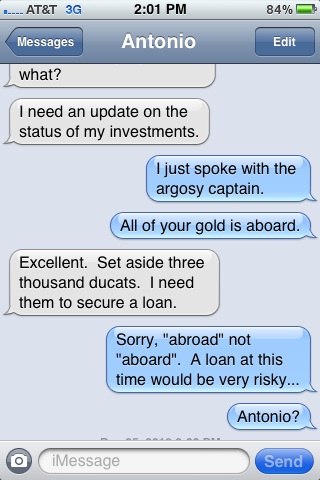
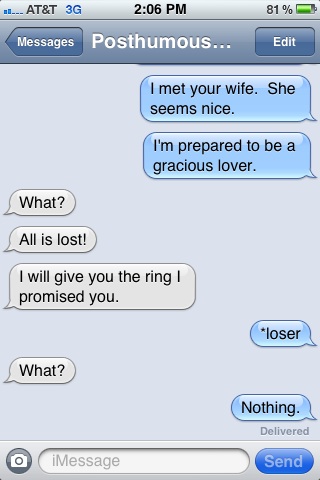
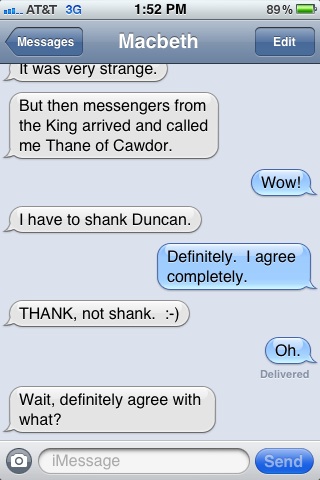
Don’t worry if you don’t know what a retrochronism is. I just made the word up. But feel free to throw it around at the dinner table and the water cooler; it’s a thing now.
Let’s say an author from an earlier time period uses a term in a sense that’s appropriate to that author’s time period. Then, the author dies and the language evolves. New technologies are invented. Culture shifts. Later readers or audiences then interpret the term as used by the author through the lens of their own time period, and incorrectly think it means something entirely different from what the author could have possibly intended. That’s a retrochronism!
This is not to be confused with an anachronism, a term generally used to describe instances where an author uses something from his own time in a work that is set before that thing would have been possible or appropriate. Shakespeare has many such anachronisms, such as the clock striking in Julius Caesar. But a retrochronism is different. It isn’t a mistake by the author; it’s an accident of history.
We’ve had 400 years now to develop a few good examples for Shakespeare. The quintessential example is from Romeo and Juliet:
JULIET: O Romeo, Romeo! wherefore art thou Romeo?
Most readers of this blog probably know that “wherefore” means “why” and not “where.” But this is far from obvious, and many newcomers to Shakespeare, entering his world through this play, assume she’s searching for him from her balcony. Who says “wherefore” anymore?
Another common example can be found in Hamlet:
HAMLET: Madam, how like you this play?
QUEEN: The lady doth protest too much, methinks.
HAMLET: O! but she’ll keep her word.
In Shakespeare’s time, “protest” meant to promise. But today we think of it in the opposite sense of a denial. So when people quote the line, they often mean that a person is denying something so much that it must be true. But Gertrude meant that the lady was promising so much that it must be false!
Those two examples are probably the most well known, but below are my ten favorites, culled from years of introducing kids to Shakespeare and from my own journey of working through the language.
TEN. Was Doll Tearsheet a One-Percenter?
DOLL: A captain! God’s light, these villains will make the word captain as odious as the word ‘occupy,’ which was an excellent good word before it was ill sorted: therefore captains had need look to it.
Playgoers who have attended productions of Henry IV, Part Two in the past year must have been taken aback by this statement, possibly even suspecting editorial interference for political purposes.
But in Shakespeare’s time, the word “occupy” was slang for having sex with someone. It’s enough to make you wonder what was really going on at Zuccotti Park after hours.
NINE. Did the Witches prophesy Kitty Hawk?
FIRST WITCH: Here I have a pilot’s thumb,
Wrack’d as homeward he did come.
Most modern audiences are familiar with the word “pilot” as meaning someone who flies an airplane, obviously not what Shakespeare meant in Macbeth.
The word “pilot” meant (and still means) someone who steers a ship.
EIGHT. Was Lord Capulet a pimp?
CAPULET: What noise is this? Give me my long sword, ho!
Here is one that comes up often when working with kids; this example from Romeo and Juliet is as good as any. Shakespeare had a lot of words for “prostitute,” but “ho” was not among them.
If you bring your voice up on the word, it’s an antiquated expression of zeal. If you bring it down, it’s a contemporary form of derisive address. Voices up, please.
SEVEN. Was Bottom a Lea Michele fan?
BOTTOM: Nay, I can gleek upon occasion.
Folks who are “Glee Geeks” might enjoy imagining Nick Bottom from A Midsummer Night’s Dream as one of them. He admitted he can “gleek” after all.
Sure, I’m being a little silly with this one, but why not? “Gleek” means to joke around.
SIX. Did Olivia have some work done?
OLIVIA: We will draw the curtain and show you the picture. [Unveiling.] Look you, sir, such a one I was as this present: is’t not well done?
VIOLA: Excellently done, if God did all.
OLIVIA: ’Tis in grain, sir; ’twill endure wind and weather.
Viola’s quip “if God did all” can set a Twelfth Night audience roaring if delivered just so. Does Viola suspect a little Nip/Tuck help is behind Olivia’s epic beauty?
Don’t start fitting Dr. 90210 for a doublet and hose just yet. Viola is merely making a reference to cosmetics.
FIVE. Was Hamlet a fan of Wayne’s World?
HAMLET: I did love thee once.
OPHELIA: Indeed, my lord, you made me believe so.
HAMLET: You should not have believed me; for virtue cannot so inoculate our old stock but we shall relish of it: I loved you not.
Again, this one came from the kids, though it was more common back in the ’90’s, when Wayne and Garth had more of an effect on the language.
Think of the line from Hamlet (and similar lines throughout the canon) as being delivered like this: “I loved you… NOT!” Yeah, they really used to do that… I kid you not.
FOUR. Was Feste creating a hostile work environment?
MARIA: Nay, either tell me where thou hast been, or I will not open my lips so wide as a bristle may enter in way of thy excuse. My lady will hang thee for thy absence.
CLOWN: Let her hang me: he that is well hanged in this world needs to fear no colours.
MARIA: Make that good.
CLOWN: He shall see none to fear.
Well hanged? Oh, no he didn’t!
Well, no he didn’t. It’s usually a safe bet to assume that any possible sexual innuendo was intended by Shakespeare, but Twelfth Night pre-dates the earliest known uses of the expression “well hung” to refer to a generous anatomical endowment. Plus, in the next line, Feste makes it clear he’s literally referring to a hanging. If the sexual pun were intended, why would Shakespeare have backed off the joke?
THREE. Did Ariel suffer from low self-esteem?
ARIEL: Where the bee sucks, there suck I.
Ouch. It’s not hard to convince high-school students that Shakespeare’s characters do, in fact, suck. But would Shakespeare have said so in The Tempest?
No. Bees, you see… eh, go ask your father.
TWO. Did the Porter invent a new art form?
PORTER: Knock, knock! Who’s there i’ the other devil’s name! Faith, here’s an equivocator, that could swear in both the scales against either scale; who committed treason enough for God’s sake, yet could not equivocate to heaven: O! come in, equivocator.
Rather than answering the knocking at the door, the Porter from Macbeth imagines himself as the Porter at the gates of Hell, and does some schtick about the various characters he might meet in that position. The expression “Knock Knock, Who’s there” is used to introduce new characters in his standup routine.
But if you’re expecting him to answer “Ophelia,” you’re going to have a long wait. The Knock-Knock joke as we know it is a twentieth-century creation.
ONE. Is Dromio of Syracuse a pothead?
DROMIO S: I am transformed, master, am not I?
ANTIPHOLOUS S: I think thou art, in mind, and so am I.
DROMIO S: Nay, master, both in mind and in my shape.
ANTIPHOLOUS S: Thou hast thine own form.
DROMIO S: No, I am an ape.
LUCIANA: If thou art chang’d to aught, ’tis to an ass.
DROMIO S: ’Tis true; she rides me and I long for grass.
Zing! Dromio’s jonesing for some weed! The Comedy of Errors is a drug play!
But not really. Dromio just longs for the freedom of greener pastures. Grass means grass, baby. However, the “she rides me” part probably does mean what you think it means.
So those are my ten favorite retrochronisms from Shakespeare. Did I miss any? Feel free to add to the list!
From Romeo and Juliet:
But, let them measure us by what they will,
We’ll measure them a measure, and be gone.
Shift around the letters, and it becomes:
The melee damage-buy seems mutual where Rahm blew a test-result law by the union.
I’ve long enjoyed the Shakespeare song parodies posted by Bardfilm and ShakespeareGeek. Now, it’s my turn to join in the fun. If this works out, maybe I’ll make it a regular feature.
The idea is to take a popular song and change the words so that it’s about Shakespeare. Here is my first attempt. Enjoy!
Filled with Woe
sung to the tune of “Somebody That I Used to Know”(With apologies to Gotye, Kimbra, and my readers…)
Now and then I think of when you were my whole tomorrow,
Like when I kissed you at your father’s masquerade;
Told myself that you were right for me,
But felt alone under your balcony,
And yet I always felt that parting was such sweet sorrow.You can get addicted to a certain kind of sadness,
Like how we know our parents never would approve;
So when you heard that I was banishéd,
Well, you said that we would still be wed,
But I’ll admit that I feared it was over.But you didn’t have to kill yourself,
Taking poison on your wedding day and come to nothing,
And losing you was hard enough,
But you’re lying dead near Tybalt and that feels so rough.O, you didn’t have to do this, no,
But I bought some poison, killed Count Paris, now I join your number;
Thus, with a kiss, I let you go,
Now I die somebody who is filled with woe!Now I die somebody who is filled with woe!
Now I die somebody who is filled with woe!* * * Now and then I think about our plan to stay together,
And now I’m guessing that you never really got my note;
A pity you did not survive,
Because the whole time I was still alive;
Thy lips are still warm, Romeo,
And so, happy dagger, kill me –
I’m somebody who is filled with woe!* * * Somebody!
Filled with woe!
Somebody!
Filled with woe!Now I die somebody who is filled with woe!
In Shakespeare’s time, people did not go to “see” a play; they went to “hear” a play. Which Shakespeare play would you like to hear?
A few months ago, I wrote a post about my Shakespeare addiction that referenced the Caedmon audio production of As You Like It. Regular readers of the blog know well the extent of this addiction, but what they may not know is the degree to which that addiction includes audio productions of Shakespeare. Most people organize their mp3 playlists with different genres of music plus one “Spoken Word” category. My iPhone has a “Music” playlist, with various Spoken Word sub-genres, including several playlists of performances of Shakespeare. Given the hours upon hours I have spent listening to these productions, I am now pleased to share with you my ten very favorite selections.
Now, if this is your thing, you really need to get The Complete Arkangel Shakespeare. This is a breathtaking collection of top-quality productions of each of Shakespeare’s plays, directed by Clive Brill and with original music by Dominique Le Gendre. The advantage of buying the set is that you will then have the option to listen to any title you choose. But if you’re not ready to make that kind of investment into the eclectic world of Shakespeare audio, I can give you my own top picks so you can get your feet wet before diving into the deep end of the pool.
Standard disclaimers apply. These are based on my own preferences, which are always subject to change. I based my rankings on writing, acting, directing, production, and music. I limited myself to modern productions only, so you won’t find Paul Robeson or Orson Welles on the list. And I’m sure there are many excellent productions I haven’t listened to. Basically, these are the ten audio productions of Shakespeare I find myself returning to again and again.
And, in keeping with tradition, my top ten list will have twenty entries. Enjoy!
Directed by Glyn Dearman; Starring Sir John Gielgud (Lear), Kenneth Branagh (Edmund), Emma Thompson (Cordelia), Derek Jacobi (France), Bob Hoskins (Oswald), Judi Dench (Goneril), Michael Williams (Fool), and Richard Briers (Gloucester).
This, to me, is the definitive audio Lear. Gielgud takes a larger-than-life character and truly brings out his humanity. An all-star cast delivers solid performances across the ensemble. This is Shakespeare the way it was meant to be performed.
Vanessa Redgrave as Rosalind gives one of the greatest audio performances I’ve ever heard. If you’re a fan of the play, or even if you’re not, you owe it to yourself to hear this amazing production.
Starring Kenneth Branagh (Richard III), Celia Imrie (Queen Elizabeth), Bruce Alexander (Edward IV), Michael Maloney (Clarence), John Shrapnel (Hastings), Stella Gonet (Anne), Jamie Glover (Richmond), and Nicholas Farrell (Buckingham).
I wouldn’t really have thought of Branagh for the hunchbacked villain, but he does a great job leading a top-notch cast in performing Shakespeare’s classic history play. I never really knew how much was going on in this play until I heard this production.
Starring Michael Feast (Julius Caesar), John Bowe (Brutus), Adrian Lester (Mark Antony), Geoffrey Whitehead (Cassius), Estelle Kohler (Portia), and Jonathan Tayler (Octavius).
I can listen to this one again and again. The exchanges between Bowe’s Brutus and Whitehead’s Cassius are electric, and Marc Antony’s powerful monologues are explosive in Lester’s more-than-capable hands.
5. The Comedy of Errors (Arkangel)
Starring David Tennant (Antipholus of Syracuse), Brendan Coyle (Antipholus of Ephesus), Alan Cox (Dromio of Syracuse), Jason O’Mara (Dromio of Ephesus), Niamh Cusack (Adriana), Sorcha Cusack (Luciana), and Trevor Peacock (Egeon).
Along his path to directing the canon, Clive Brill has a lot of fun with Shakespeare’s only slapstick comedy. Silly sound effects and comical music underscore fantastic comic performances by a brilliant cast. Remember, dying is easy; Comedy‘s hard.
Starring Michael Feast (King John), Eileen Atkins (Constance), Michael Maloney (Bastard), Geoffrey Whitehead (Phillip), Trevor Peacock (Hubert), Bill Nighy (Pandulph), and Margaret Robertson (Elinor).
Michael Maloney steals this particular show, as the Bastard often does in King John. But strong performances across the cast have the power to churn the blood and tug a few heartstrings as well.
There are a number of audio Macbeths to choose from, but I give Anthony Quayle pride of place. Mood-enhancing sound effects and strong performances across the board make this production the Macbeth of choice.
Starring Hugh Quarshie (Othello), Anton Lesser (Iago), Emma Fielding (Desdemona).
Lesser’s edgy voice creates a dangerous Iago, who provokes a genuine sense of menace. Quarshie’s passionate Othello makes for a worthy tragic figure. Together, the two performances leave us with an unforgettable audio experience.
Directed by David Timson; Starring Samuel West as Henry V.
This is a stirring and creative production of Henry V. Vibrant interpretations of even the minor characters make for a consistently interesting and entertaining presentation of the well-beloved history.
Starring Niamh Cusak (Rosalind), Stephen Mangan (Orlando), Gerard Murphy (Jaques), Clarence Smith (Touchstone), and Victoria Hamilton (Celia).
This is a really great audio production of the play. I rated the other version much higher, but I actually prefer Dominique Le Gendre’s music in this one. And for As You Like It, the music is no insignificant character.
11. Measure for Measure (Arkangel)
Starring Roger Allan (Duke), Simon Russell Beale (Angelo), Stella Gonet (Isabella), Jonathan Firth (Claudio), and Stephen Mangan (Lucio).
Here’s another one I keep revisiting. Beale and Gonet create sparks as Angelo and Isabella, Mangan is brilliant as Lucio, and Allan’s Duke never lets you forget who’s in charge. I think I want to go listen to this one right now.
Starring Paul Scofield (Lear), Alec McCowen (Gloucester), Kenneth Branagh (Fool), David Burke (Kent), Harriet Walter (Goneril), Emilia Fox (Cordelia), Sara Kestelman (Regan), Richard McCabe (Edgar), and Toby Stephens (Edmund).
Okay, so Paul Scofield as Lear should be enough, right? But he is supported by a great ensemble cast in a well-directed version of one of the greatest plays ever written. Check it out!
Starring Ian McKellen (Prospero), Scott Handy (Ariel), Emilia Fox (Miranda), Neville Jason (Antonio), Benedict Cumberbatch (Ferdinand), and Ben Onwukwe (Caliban).
Okay, so Ian McKellen as Prospero should be enough, right? But this is another high-quality Naxos masterpiece – a must-have for Shakespeare audio collectors.
14. Henry IV, Part One (Arkangel)
Starring Jamie Glover (Hal), Julian Glover (Henry IV), Alan Cox (Hotspur), and Richard Griffiths (Falstaff).
I really love this play, and the Arkangel production does it great justice. Griffiths creates a Falstaff with his voice that has the power to rival his stage counterparts. Each scene in this production is like a little gift-wrapped present.
Anton Lesser is the man! This time, he lends his distinctive voice to the Melancholy Dane, striking just the right balance between contemplative and bitter, between witty and mad. There are certainly other audio Hamlets, but Lesser is greater!
16. A Midsummer Night’s Dream (Naxos)
Starring Warren Mitchell (Bottom), Michael Maloney (Oberon), Sarah Woodward (Titania), Jack Ellis (Theseus), Benjamin Soames (Lysander), Jamie Glover (Demetrius), Cathy Sara (Hermia), Emily Raymond (Helena), and Ian Hughes (Puck).
Again, I have several versions of the Dream to choose from, but I think I’ll take Naxos for the win. I’ve heard these words so many times, it’s an impressive production that can still make me laugh at them.
Starring Rupert Graves (Richard II), Julian Glover (Bolingbroke), and John Wood (John of Gaunt).
Let’s talk of Graves. (See what I did there?) He gives an outstanding performance as Richard, which is important, because – let’s face it – he does tend to go on a little.
18. Henry VI, Part Three (Arkangel)
Starring David Tennant (Henry VI), Kelly Hunter (Margaret), Clive Merrison (York), Stephen Boxer (Edward), John Bowe (Warwick), and David Troughton (Richard).
This is the beauty of the Arkangel series. You can listen to any play, any act, any scene you like. And sometimes, you just really need to hear the “paper crown” scene. When that day comes for you, this is the recording you’ll want to have.
19. Romeo and Juliet (Arkangel)
Starring Joseph Fiennes (Romeo), Maria Miles (Juliet), and Elizabeth Spriggs (Nurse).
Dominique Le Gendre’s love theme for this production becomes the theme song for the entire Arkangel series. Fiennes and Miles are wonderful, as you knew they would be. When you want to hear this play, hear this version.
Starring Stella Gonet (Viola), Jonathan Keeble (Orsino), Jane Whittenshaw (Maria), Malcolm Sinclair (Andrew), David Timson (Feste), Lucy Whybrow (Olivia), Christopher Godwin (Malvolio), and Gerard Murphy (Toby).
Well, what can I say, this is my twentieth favorite. But it’s the best of all of the Twelfth Night productions I own, and it’s a great presentation of a fun play, so why not give it a listen?
The sixth-graders I’m working with are studying figurative language now, so we looked at figurative language in a scene from Antony and Cleopatra. They enjoyed the “salad days” metaphor, and the exchange where Cleopatra asks her servant Mardian about what it’s like to be a eunuch.
Cleo. Hast thou affections?
Mar. Yes, gracious madam.
Cleo. Indeed!
Mar. Not in deed, madam; for I can do nothing.
In other Shakespeare teaching news, I met with the eighth-graders who are doing As You Like It, and it looks like I will be working with them after all. And I’ve also hooked up with an enthusiastic seventh-grade class that has already read Hamlet, Much Ado about Nothing, and Romeo and Juliet. It looks like I have a few online classrooms to set up.
More to come!